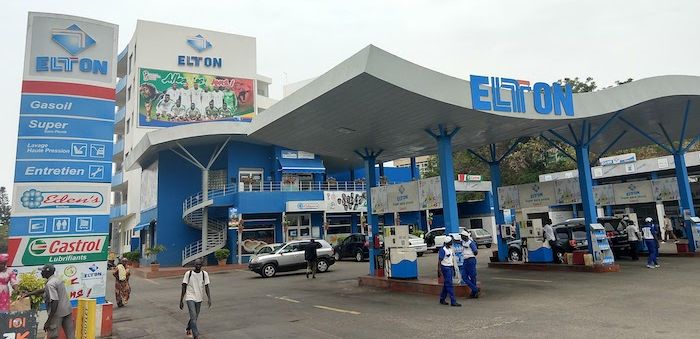In Senegal: Local Case Studies Spark Student Interest
Wednesday, February 23, 2022

An Elton service station in Dakar, Senegal. (Image by Diana E. Páez).
Case studies push business school students to make realistic considerations, start layered conversations, and develop functional problem-solving skills. By placing students inside real-life situations, academic case studies are a key tool in developing modern business leaders. For students learning in high-income countries within prominent business schools, most case studies mirror the world they see, including familiar corporations and dilemmas they’d expect to experience on the job. But for students in low- and middle-income countries (LMICs), that’s rarely the case.
Instead, LMIC students often have to make significant intellectual, geopolitical and logistical leaps for cases written in and about developed economies to work for them. They need to imagine how the companies featured mirror those in their region and shift the situations detailed in a case study to match the ones they see locally. Both students and instructors guiding them need to adjust the content to their locality, whether that means translating it into another language or imagining how different cultural norms would impact a discussion question. Each one of these steps pulls students further from the goal of the process—immersing them in the case itself to develop their creative business minds—but case studies about organizations and dilemmas in LMICs can provide a remedy.
The Case for Local
When leaders at the William Davidson Institute at the University of Michigan (WDI) and the African Institute of Management (IAM) in Senegal set out to build a supply chain program for local students, they knew they needed to include case studies about that local region in their curriculum.
Paul Clyde, president of WDI, and Noel Watson, founder of OPS MEND and research fellow at WDI, came together with Alassane Fall, engineer and current director of IAM’s supply chain management master’s program, to build the curriculum. Supply chains in emerging markets are complicated, and students need the tools and experience to tackle these complexities. Without locally—or even regionally—focused cases, they would be learning business concepts in the vacuum of the classroom, without any opportunity for practical application.
“Students are more likely to understand the case and be at ease learning it if the case studies are set locally,” Fall said. “They’re more likely to be interested and involved because the situations are never the same otherwise.”
Effective case studies surround students with real-life business dilemmas they need to resolve. If the case study doesn’t resemble a student’s real life, it will have limited learning value in the classroom. Watson shared why this representation is so critical.
“At some point, without seeing that representation, the takeaway is that much less,” Watson said “There’s almost a sense that you don’t really believe the case because it’s not really about where you are. The idea is to address that head-on with cases set in Africa or Senegal.”
LENDING WDI’S EXPERTISE
WDI’s expertise sits at the intersection of what’s needed for the task of creating these important case studies, with its network of business relationships in LMICs and rigorous academic research practice. WDI Publishing has more than 600 cases, mini-cases, exercises, and conceptual notes in its collection, which have been utilized in more than 800 universities around the world since the group was established within WDI in 2007.

Students are more likely to understand the case and be at ease learning it if the case studies are set locally. They’re more likely to be interested and involved because the situations are never the same otherwise.
– Alassane Fall
Combined with the knowledge and skills of a local leader like Fall, WDI Publishing can identify real-life business challenges and develop case studies that encourage students to brainstorm innovative, accessible solutions.
“Our mission is to equip economic decision-makers in emerging countries with the tools of commercial success. What does it mean to equip economic decision-makers if not through training and education?” said Clyde. “It’s very much in line with what we’re doing.”
WDI also has the publishing capabilities to make these cases a reality. Sandra Draheim, Manager of WDI Publishing, explained how her team helped bring these Senegal-centered cases to fruition. “WDI has the capability and the platform to deliver cases like these, because we have the horsepower and processes to professionally edit, format, publish, and distribute them.” In a world where academic teaching materials are costly to produce and distribute, there’s often a lack of case studies written about doing business in emerging economies. With WDI’s resources, LMIC-focused case studies can be published and adopted by the appropriate institutions around the world.
CASE STUDIES THAT MATTER
The first case study produced by the team focused on managing supply, demand, and delivery at Elton Oil, a petroleum products company operating in Senegal. In this case, an interim export manager is faced with an unexpected drop in supply from the country’s refiner. Students are challenged to schedule deliveries to the company’s gas stations despite the constraints, and are asked to use a provided worksheet to support their decisions.
Diana E. Páez, Senior Director of Grants and Partnerships at WDI, wrote the case with Watson and Fall in both English and French, eliminating yet another barrier that many Senegalese students face when using other case studies. These details matter, Páez said. “It matters that students can recognize the places, the names of people. It makes it more real.”
For IAM students, having a case centered on Elton Oil meant they could leave their classroom and drive past the business they’d just been discussing. It also meant the dilemmas were literally at their feet, making the solutions that much more tangible. The same was true for the second case (available here), which focused on supply chain changes in Africa through COVID-19, and it will ring true for the third case in the pipeline, covering inventory optimization for a Senegalese steel company.
Since the partnership between IAM and WDI began, student interest in the program has grown significantly. Just a handful of students participated in the first offering of the supply chain program back in 2017. For the 2020/2021 academic year, 30 students took part, making it one of IAM’s more popular offerings.
“After we discuss the cases, most of the time, the students say they appreciate and love them, they say they learned a lot, and that it makes a big difference,” Fall said. “They’d like the managers from the case locations to come to the class and talk about what they’d do in the situation.”
In fact, one student from IAM was actually hired by Elton Oil, said Fall, who is hopeful this student will return as a guest to the course to add another layer of learning for current students.
IAM students aren’t the only ones benefitting. WDI has helped develop local cases in other regions of the work including the Philippines and the Middle East. These cases, available digitally at no cost, have been downloaded across the world by professors and international business leaders. This enthusiasm, along with the overwhelmingly positive response from students, is an indication that there’s a need—and WDI is working to address it.
About WDI
At the William Davidson Institute at the University of Michigan, unlocking the power of business to provide lasting economic and social prosperity in low- and middle-income countries (LMICs) is in our DNA. We gather the data, develop new models, test concepts and collaborate with partners to find real solutions that lead to new opportunities. This is what we mean by Solving for Business—our calling since the Institute was first founded as an independent nonprofit educational organization in 1992. We believe societies that empower individuals with the tools and skills to excel in business, in turn generate both economic growth and social freedom—or the agency necessary for people to thrive.
